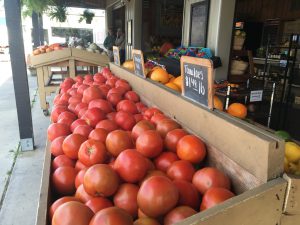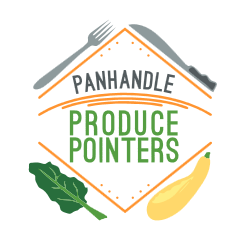
Marketing fresh produce effectively is key to business sustainability.
The local food movement has grown tremendously over the past several years. People have become more interested in how their food is produced and where it comes from. New farms have popped up to try to satisfy this demand. You might be one of these new farmers and you probably chose to take this endeavor on because you love marketing!….or probably not. Most beginning farmers are drawn to the industry because of the benefits of working for themselves, working with and in nature, and/or growing their own food. Those are all great aspects of growing fresh produce, but to make it a sustainable business you have to sell it to somebody for a price that will earn a profit.
Realizing that many new or beginning fresh produce farmers are not enamored with the idea of marketing, and maybe have even jumped into their project without fully exploring this important task, there are some practices that must be considered:
-
Check with Local Municipalities for proper licensing and permits:
The Florida Department of Agriculture and Consumer Services (FDACS) is the regulatory authority for selling produce in Florida. FDACS does not require a license or permit to sell fresh, unprocessed fruits and vegetables to many markets. However, county and/or city permits may be required in your area to sell fresh, unprocessed produce.
-
Food Safety:
Foodborne illnesses are a serious issue that require the attention of growers and buyers. Considering the complexity of the food system, there is potential for widespread foodborne illnesses to occur because of contaminated produce. Food safety plans are required by the buyer for some markets (distributors, large retail groceries, etc.) while most direct to consumer sales do not require a written food safety plan. However, food safety plans are not difficult to make and will help prevent foodborne illnesses. There are also new federal regulations that growers must be aware of. Read this article to see if your farm is exempt or not: Things You Should Know About Farm Food Safety
-
Insurance:
Insurance is important for any farm or business. It can protect against accident related losses on the farm, or cover the farm products once they leave the farm. Communicate with the potential buyer to find the minimum requirements necessary to supply to their companies. After the requirements are discovered, consult with an insurance professional on your operations insurance needs.
-
Volume/Supply:
The amount of product can be a limiting factor for beginning growers. Some markets prefer to purchase in large quantities, such as by the pallet or by the truckload. Typically, small growers sell low volumes of product for premium prices at specialty markets where customers are willing to spend more to purchase directly from the grower. Because of this, specialty market growers generally can be successful on a smaller area of cultivated land. Conversely, when selling to wholesale buyers and distributors, the farmer can expect to receive less for their goods, but will make up for it in the quantity in which they sell. It sometimes requires a different mindset than many small growers have, and this must be heavily considered before entering these types of markets.
Supply must be consistent throughout the harvesting season when using the wholesale and distribution markets. Small growers who sell directly to consumers have experience with this as they strive to bring the variety of different products to their customers each and every week. In the same manner, a grower selling to larger markets must not only have consistent supply, but have it in the larger quantities in order to satisfy the buyer, and make a profit with lower prices. Multiple plantings, continuously bearing crops, and communication on availability are all key in providing the buyer with realistic expectations of the products the farmer will have or currently has in hand.
These are just a few of many subjects related to marketing that need to be pondered before ever planting a crop. The Gulf Coast Small Farms team of UF/IFAS Extension faculty have created short checklists for six different types of marketing opportunities for fresh produce growers looking to enter specific markets. These publications will not give all of the information necessary to begin to sell in the market, but will give new producers a good starting point.
 Produce Marketing Checklists:
Produce Marketing Checklists:
-
Farmers’ Markets
-
Farmers’ Market Nutrition Program for WIC eligible customers
-
Roadside Stands
-
Restaurants
-
Farm to School
-
Wholesale and Distributors
These publications and more are available at the Panhandle Produce Pointers website. For more information on marketing fresh produce grown on your farm, contact your local UF/IFAS Extension Agent.
- Battling Scab in Panhandle Pecan Trees - September 22, 2017
- Where to Start with Marketing Fresh Produce? - April 28, 2017
- Using the Linear Bed Foot System for Vegetable Fertilization - August 26, 2016
